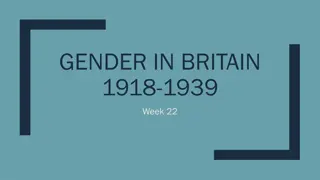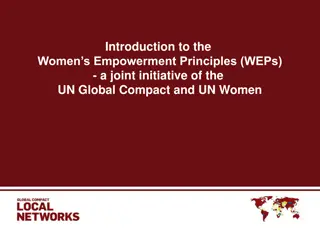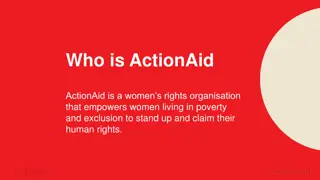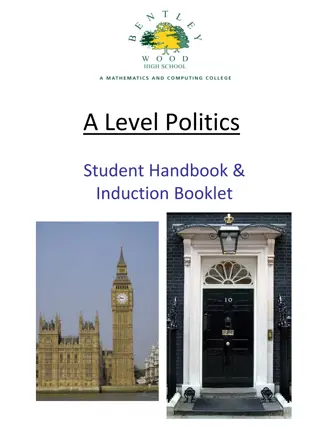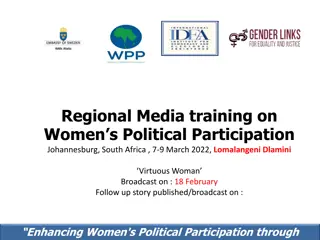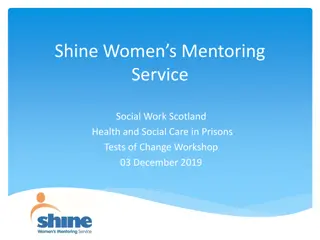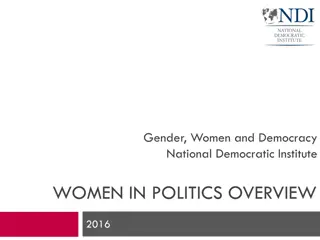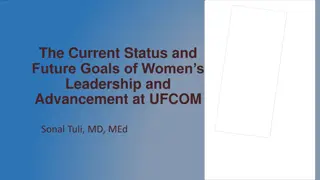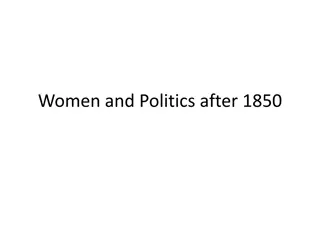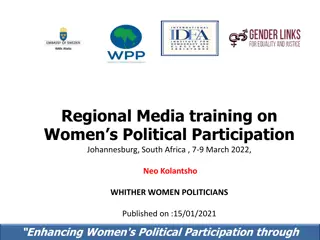Empowering Women in Politics: The Suriname Experience
The 8th Annual Gathering of Women Parliamentarians highlighted the importance of diversifying political power for building inclusive societies. Suriname faces challenges in enacting quota legislation but has seen success in increasing female legislators through non-quota measures. Initiatives focusing on gender equality in politics, awareness-raising activities, and capacity-strengthening programs have contributed to the rise of women in Parliament. The country's historic overview shows progress in female representation, emphasizing the positive impact of gender-balanced participation in political decision-making.
Download Presentation

Please find below an Image/Link to download the presentation.
The content on the website is provided AS IS for your information and personal use only. It may not be sold, licensed, or shared on other websites without obtaining consent from the author. Download presentation by click this link. If you encounter any issues during the download, it is possible that the publisher has removed the file from their server.
E N D
Presentation Transcript
THE 8TH ANNUAL GATHERING OF WOMEN PARLIAMENTARIANS OF PARLAMERICAS Diversifying Political power to build inclusive societies The representation women and minority groups in Parliament Presenter: Wendell Asadang June 1, 2016
QUOTE OF UN SECRETARY BAN KI-MOON: Countries with more gender equality have better economic growth. Countries with more women leaders perform better. Peace agreements that include women are more durable. Parliaments with more women enact more legislation on key social issues such as health, education, antidiscrimination and child support. The evidence is clear: equality for women means progress for all .
In Suriname we do not have legislation on quota and are aware that we should promote and increase participation of women in more decision making positions. But to come up with a quota we believe it would be a very difficult process to reach consensus together with the necessary support to enact and implement such a law, due to the short time before last year s elections.
HISTORIC OVERVIEW OF FEMALE LEGISLATORS 2005 - 2015 2005 There were 13 female legislators elected, which was 25.5 % of the 51 parliamentarians 2010 There was a strong decline in female Parliamentarians, 6 female were directly elected (11.7%) and through a resignation of a male, a female took the seat in Parliament which makes it into 7 female members which is 13.7 % of Parliament members. 2015 There is an increase of elected female legislators to 14 which is 27.5% of the members in Parliament. In addition to the increase of women in parliament, the President of the Republic of Suriname has appointed 4 women in the council of Ministries out of the 17.
THE SUCCESS OF SURINAMES INCLINE OF WOMEN ELECTED IN PARLIAMENT IN 2015 HAS TO DO WITH THE NON-QUOTA MEASURES THAT HAVE BEEN IMPLEMENTED. Gender equality in politics as a pillar of the ongoing capacity strengthening program in collaboration with UNDP entails actions to raise awareness on gender balanced representation. The National Assembly organized several round table discussions and activities to enhance the awareness of women s participation in political parties. The focus of these activities was to get the board of the political parties active on this matter. Also in anticipation to the elections of 2015, a year project has been set out by The National Assembly to create more awareness in the political parties to place more women on the candidate list for parliament and among the voters to vote for women placed on the candidate lists. This was implemented by working with the political parties already represented in Parliament to delegate women to participate in a year program to strengthen their position in their political parties. These women were coached on more political confidence to claim their place on the foreground rather than working hard on the background. They were also given air time on television to increase their visibility in society, taking into account that these women will gain more support of the voters through publicity. Towards the election of 2015, The National Assembly had contracted a consultant as part of our project, to assist with the promotion of a campaign for all women who participated in the project and would be candidates on the list of their political party. This consultant had already begun a campaign of her own (OOK ZIJ (SHE TOO) Campaign) together with the Ministry of Internal Affairs to promote more women in decision-making positions. Our project in collaboration with other projects such as the OOK ZIJ Campaign resulted in a country wide campaign which delivered expected results. The President had also urged political parties to make sure that at least 30 % of their candidates are women. All these actions have resulted in the increase of more female s legislator as mentioned above.
FLYER OF THE SHE TOO CAMPAIGN She too motivates, brings balance, organizes and is successful.
MINORITY REPRESENTATION IN PARLIAMENT As minority group in Parliament we think about Amerindians and Maroons, in Parliament we currently have 15 members from the interior, which is 29.4 % of all members in Parliament. From these 15, 40 % are women and 60% are men. In this group you have 6 women from Amerindians and maroon descent which is 42.9 % the total number of female legislators. This means a great opportunity to have a say in the decision- making process or making laws that will affect these groups, but in general there are also a couple of setbacks for this group, not all the members are part of the coalition. Members tend to follow the view of their political leaders, as part of the coalition you support the government, if you are in the opposition you vote against laws proposed by the ruling government or regulations of the coalitions so they miss a chance to form one fist and collaborate to influence laws and regulations that will impact this group.
DIFFICULTIES THAT PREVENT WOMEN TO PARTICIPATE IN POLITICAL LEADERSHIP AND DECISION-MAKING Politics is taking place in the public sphere, whereas in perspective of the upbringing, women belong in the private sphere The pressure and perception of society on females making long hours away from their family. Men tend to distrust their partner that spend more time away than at home Support from the family is important for the women to achieve their goals in a political career. In most situation this is absent. For the minority groups, higher education is a great setback for this group, after they finished secondary school in the interior these girls need to go the city to continue higher education. Proper accommodation for these girls is absent; therefore the opportunity is scarce for them to study further. Another issue for educated women from minority groups is the rule that in order to participate and be a candidate representing a district, you should be based 2 years previous the election in relevant district. The lacks of highly qualified members make it difficult for these minority groups to have strong women in leading positions.
Gran Tangi Thank You Gracias
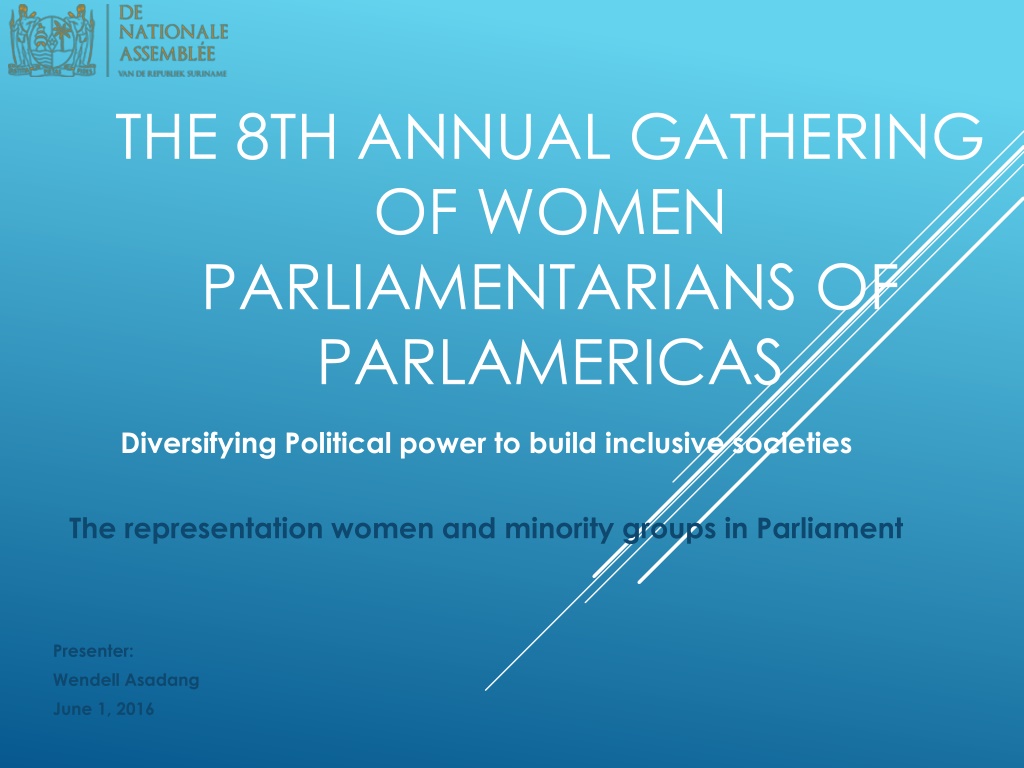
 undefined
undefined










